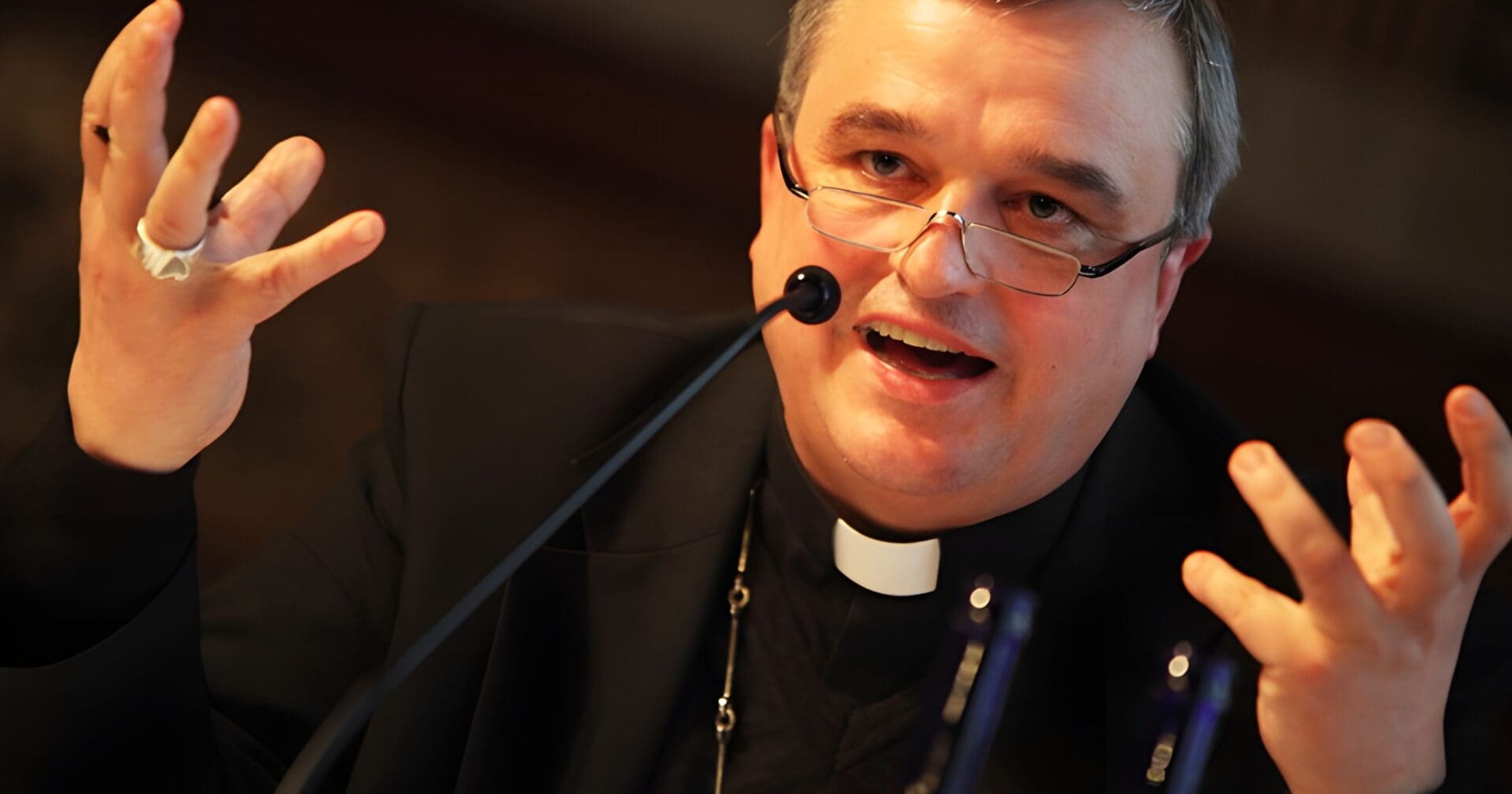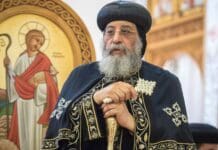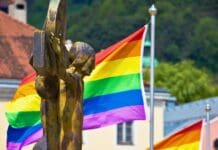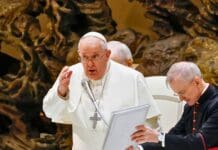Bishop Karl-Heinz Wiesemann of the Diocese of Speyer in southwest Germany has issued a letter authorizing the blessing of same-sex couples.
Bishop Wiesemann, who has been bishop of the diocese since 2008, emphasized the need for a more inclusive and compassionate pastoral approach, grounded in the Gospel of Jesus.
He stated, “Both with regard to believers whose marriages have broken down and who have remarried, and especially with regard to same-sex oriented people, it is urgently time for a different perspective to find a pastoral attitude inspired by the Gospel.”
Bishop Wiesemann’s letter assures pastors that they won’t face sanctions for conducting such blessings. He acknowledges the diversity in beliefs within the Church but encourages those who are willing to offer blessings to contact the diocesan office, facilitating connections with like-minded pastors in their regions.
The bishop says his decision comes after a resounding 93% of participants at the German Synodal Way expressed their support for blessing celebrations for loving couples, including same-sex and remarried couples. He said he aims to honor God’s mercy and accommodate the spiritual needs of couples who have longed for recognition within the Church.
In the near future, “a guideline from the German Bishops’ Conference with an appropriate blessing formula” will be released, he says.
The Vatican has not publicly responded so far.
Read below a translation of his letter:
To all
Priests, Deacons,
Pastoral and Parish Workers,
in the Diocese of Speyer
Speyer, November 2, 2023
Dear Brothers,
Dear Colleagues in Pastoral Ministry,
During the last meeting of the Synodal Path in March of this year, a majority of 93% approved the possibility of “blessing ceremonies for people who love each other.” In the meantime, a working group appointed by the Bishops’ Conference and the Central Committee of German Catholics (ZDK) has been established to prepare guidelines for this matter. After considering and reflecting on the entire Synodal Path during the Autumn Bishops’ Conference, I would like to address you on this important pastoral issue.
For some time now, we have been striving in our diocese to have a pastoral approach characterized by God’s compassion and concern for couples who, for various reasons, cannot or do not wish to receive the sacrament of marriage. My own pastoral experience has also moved me, and I am deeply aware of the great need and profound longing of many, often deeply faithful people, for God’s blessing and the benevolent support of the Church in their shared life, with all its searching, failures, new beginnings, and moments of happiness – in other words, all that makes human life so fragile and precious. In this context, Jesus’ directive from the Sermon on the Mount, “Do not judge, so that you may not be judged” (Matthew 7:1), has become increasingly essential as a key for a pastoral approach that lives out the Gospel of Jesus. I also find this approach reflected in Pope Francis’s often-quoted words, “Who am I to judge?”
Both in relation to believers whose marriages have broken down and who have remarried, and especially with regard to same-sex-oriented people, it is urgent, especially in light of a long history of deep-seated wounds, to find a different, Gospel-inspired pastoral attitude, which many of you have already been practicing for some time. Therefore, I advocated for a reevaluation of homosexuality in church teaching and also voted in favor of the possibility of blessing ceremonies for same-sex couples during the Synodal Path. I stand by this position, and I hope that this pressing issue of our time can also experience positive development on the path of the World Synod.
On this journey together with the Universal Church, we must and should ask ourselves how we can genuinely and compassionately approach those who, out of sincere faith, seek God’s blessing in their life together and assure them of God’s accompanying and healing presence through the blessing. This should also be a sign from the Church that they belong to our community. The blessing in the name of the Church bears witness to these faithful individuals that they are not abandoned by God in their situation and encourages them to find their path with God within the Church community. It is clear that this is not about celebrating a sacrament but rather offering a blessing. The primary task of the Church is to bear witness to God’s boundless and unconditional love, affection, and mercy. Blessing ceremonies respond to the deep longing of people for healing, recognition, and security. Here, we must develop a pastoral approach that is sensitive to the many wounds suffered by people within the Church. The commitment and commitment often displayed in such relationships, which often testify to our Christian faith, undoubtedly have their own value in God’s eyes and a share in God’s blessing and salvation story with His people.
Therefore, I kindly ask you as pastoral caregivers in our diocese to approach these believers with great pastoral sensitivity and, if they request it, to seek suitable ways with them so that they can experience God’s blessing on their shared journey. No one will be forced to participate in such blessing ceremonies, but, on the other hand, no one who conducts such ceremonies should fear sanctions. On the contrary, it is important to me that we offer these faithful individuals a clear sign of God’s presence within the Church community.
It may be that a home setting (possibly including the blessing of their shared home) is more suitable for the blessing. However, a blessing ceremony can also take place in a church or another appropriate location. The ceremony should clearly distinguish itself in words and symbols from a church wedding and should explicitly strengthen the love, commitment, and mutual responsibility that exists within the relationship. Sensitivity and discretion are essential here.
A guideline from the German Bishops’ Conference with an appropriate blessing formula is currently being prepared. Until it is completed, the guide from the Association for Catholic Family Education and Pastoral (AKF e.V.) can serve as an orientation and reference. The 52-page publication is available for download on the AKF’s website at www.akf-bonn.de.
If you cannot reconcile a blessing ceremony with your conscience and your understanding of faith, I respect this decision. In this case, please refer couples seeking a blessing to the Diocesan Ordinariate. In the future, they can contact a referral center in the Department I – Pastoral Care and will be connected to a pastoral caregiver in their region based on a list.
I am grateful to pastoral caregivers who are willing to lead such blessing ceremonies in the diocese, even beyond their own pastoral area. To create the mentioned list for referrals, I kindly ask you to contact the Diocesan Ordinariate at segenspenden@bistum-speyer.de by mid-November.
I warmly invite all of you to the training session on “Valuing Diversity” on Wednesday, November 15, 2023, from 2:00 PM to 5:00 PM at the Caritas Altenzentrum St. Hedwig, Leipziger Straße 8, Kaiserslautern. There, we can exchange experiences and address any questions (registration at: pfarrei-lebensraeume@bistum-speyer.de).
The request for blessings from many couples reflects a deep longing to be able to shape their shared life under God’s protection and guidance. It reveals a yearning for God beyond the previously drawn boundaries. This yearning should be taken seriously and points to the biblical promise of God’s presence wherever there is kindness and love. With the possibility of blessing ceremonies, we aim to do justice both to God’s mercy and to the situation of the people.
Let us continue on this path together, remaining in dialogue.
With my heartfelt gratitude for your pastoral service and in prayerful connection,
Yours,
+ Dr. Karl-Heinz Wiesemann
Bishop of Speyer
Photo credit: cc-by-sa-2.0 via Flickr

















